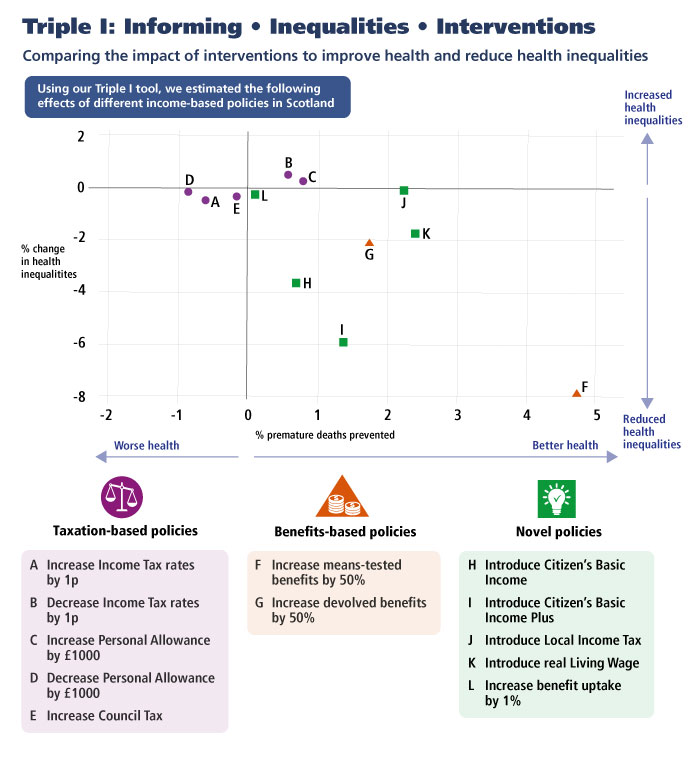NHS Health Scotland
|
|
Comparing the impact of income policies on health and health inequalities
NHS Health Scotland yesterday published a report comparing the impact of income-based policies on health and health inequalities for the Scottish population.
We found that increasing means-tested benefits by 50%, introducing Citizen's Basic Income schemes that incorporate Income Tax increases, increasing devolved benefits by 50%, and introducing the real Living Wage could all help to reduce health inequalities and improve health in Scotland.
We used the ScotPHO 'Informing Interventions to reduce health Inequalities' tool (the Triple I tool) to model the impact of income policies on health and health inequalities. The basis of the tool is that health improves as household income increases. We compared a range of policies across three categories: taxation-based, benefits-based and some new approaches, including two Citizen's Basic Income policies. Of the policies we modelled, we found that the introduction of the Citizen's Basic Income scheme with additional payments for disabled people would be most cost-effective for both reducing premature deaths and reducing health inequalities. We found that the most effective income-based policies for reducing health inequalities are likely to be those that disproportionately increase incomes for those with the lowest incomes.
Action on income is not just reserved to one or two agencies; a wide range of local and national stakeholders can play a role in influencing household income and, in turn, health.

Using our Triple I tool, we estimated the effects of different income-based policies in Scotland
Liz Richardson, Public Health Intelligence Adviser at NHS Health Scotland said:
"It is not right that thousands of people die prematurely as a result of health inequalities. If we are to change this, we need to understand the impact of different policies on improving health and reducing health inequalities. That’s why we designed the Triple I tool. It allows national and local decision makers to model the impact of various policies on various health outcomes."
"Whilst we hope these findings on income-based policies will be useful, we also hope that national and local decision makers will see benefit in using the tool to model a whole range of policies and inform their own decision making. Being able to compare the impact on health of various policies without actually implementing them has the potential to provide an efficient way of making sure that we take action based on what works. And that could take us closer to delivering the fairer healthier Scotland we all want."
Visit ScotPHO for the full Income-based policies in Scotland report
For more information on the impact of income on health, visit our income inequality page.
Original article link: http://www.healthscotland.scot/news/2018/october/comparing-the-impact-of-income-policies-on-health-and-health-inequalities


